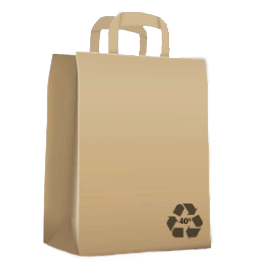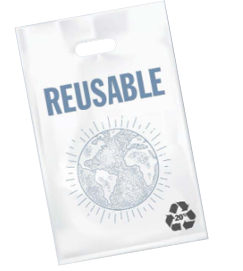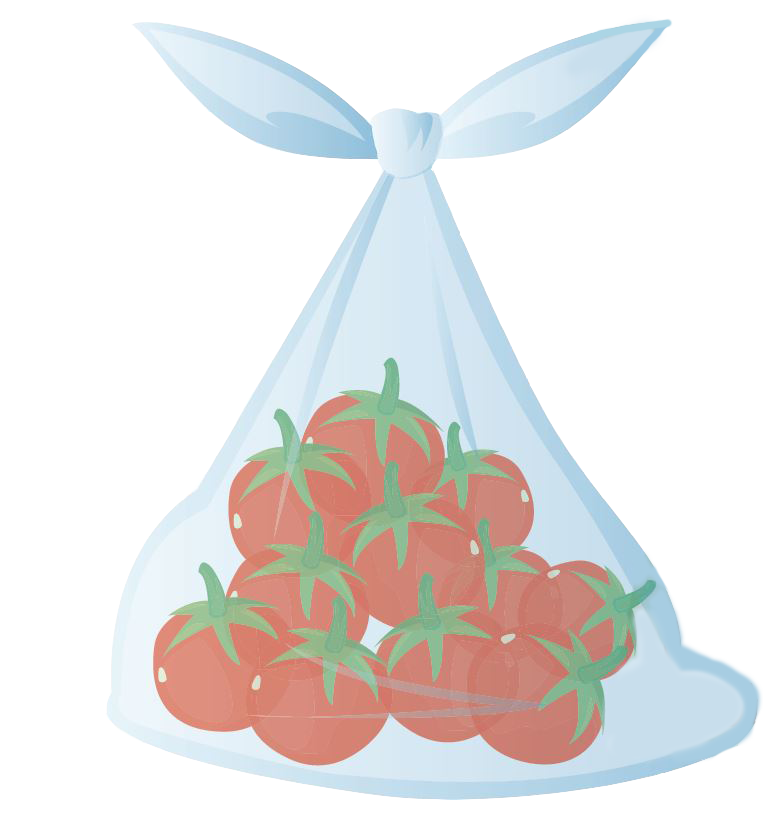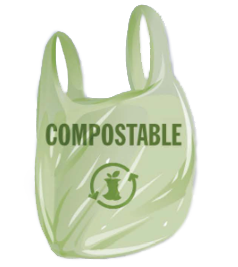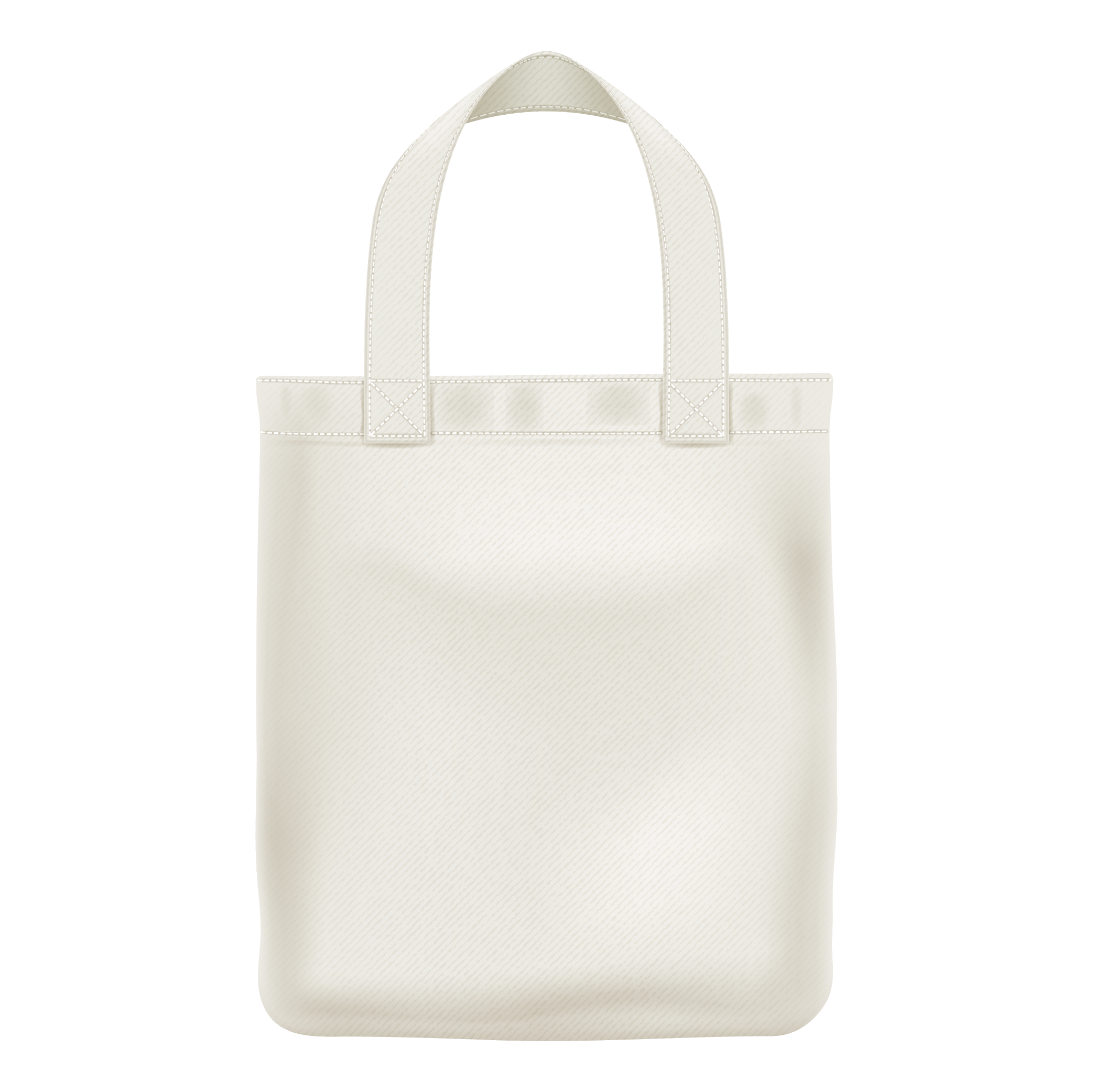Washington's single-use plastic bag ban
Plastic bags are a major contaminant in Washington’s recycling facilities, waterways, roadways, and environment. Washington's Plastic Bag Ban will reduce pollution by prohibiting single-use plastic carryout bags and charging a fee for acceptable bags in businesses beginning in October 2021.
Upcoming changes to the single-use plastic bag ban law
Washington’s Legislature passed a new law in 2025, ESHB 1293, that makes changes to the state’s single-use plastic bag ban starting Jan. 1, 2026.
Plastic bags continue to be 2.25 mil thick. Two-year delay in thickness increase: Plastic film bags must continue to have a minimum thickness of 2.25 mil until Jan. 1, 2028. Under HB 1293, the Legislature delayed the required thickness increase to 4 mil from Jan. 1, 2026 to 2028.
12 cents for plastic, 8 cents for paper: Starting Jan. 1, 2026, retailers and restaurants must collect a 12-cent charge for plastic film carryout bags given to customers. The charge for paper bags remain at 8 cents. The increase in the plastic bag fee is unchanged from the original law, Chapter 70A.530.020 RCW.
Additional 4-cent penalty to discourage plastic film 4-mil bags: For retailers and restaurants that choose to distribute plastic film bags that are 4 mil thick or greater, an additional 4-cent charge must be applied to the 12-cent bag fee to customers (16-cents total). This penalty will be in effect Jan. 1, 2026 until Dec. 31, 2027. Businesses that provide 4 mil thick plastic film bags must deposit the 4-cent penalty into the Washington State waste reduction, recycling and litter control account under Chapter 70A.200.140 RCW.
Allowed and banned bags
Large paper carryout bags: $0.08
Large paper carryout bags are 882 cubic inches or larger. They must contain at least 40% post-consumer recycled content or wheat straw, and they must be labeled with this percentage on the bag.
Small paper bags: Charge optional
Stores are not required to charge for small paper bags (bags smaller than 882 cubic inches). However, all paper bags must meet the 40% post consumer recycled content or wheat straw minimum and be labeled with this percentage on the bag.
Thick, reusable plastic film bags: $0.08 until Dec. 31, 2025, and $0.12 starting Jan. 1, 2026.
Must be 2.25 mil thickness, contain 40% post-consumer recycled content, and be labeled with these requirements as well as the word “reusable” on the bag.
Plastic produce bags: No charge
Plastic produce bags used by customers in store are exempt from the ban.
Compostable bags: Not recommended
Compostable bags are not accepted at most commercial composting facilities in Washington. Before you offer these bags, reach out to your local composting facility to ensure they are accepted.
Reusable bags
Bringing your own clean and reusable bag is the best option. Using your own reusable bag is free.
Single-use plastic carryout bags: Banned
All single-use plastic carryout bags are banned.
Green, brown, and beige plastic bags: Banned
Only compostable bags can be tinted green or brown (Chapter 70A.455 RCW). No bag can use the following misleading labels: "biodegradable," "decomposable," "degradable."
Ban benefits state's recycling system
During the 2020 legislative session, the Legislature passed a statewide ban on single-use plastic bags, an effort to reduce plastic pollution, litter, and waste.
This ban will benefit the state's recycling system on several fronts:
- Reducing contamination in the recycling and compost systems
- Promoting reuse and recycled content
- Building consistency in policy and enforcement across the state
- Supporting the recycled paper industry
As Washington transitions away from single-use plastic bags, we will continue to provide technical assistance, education, and outreach materials to businesses and the public. We collaborated with local governments, retailers, business associations, and non-profits to begin this effort, and have developed a bag ban outreach toolkit that is formatted for accessibility and available in 17 languages.
Using our reporting form, anyone may submit an observation of businesses not in compliance with thes requirements. We will use this information to follow up with businesses to ensure their understanding of the new law. Repeated non-compliance may result in penalties.
- Ecology’s 2022 litter study estimates 18.7 million plastic carryout bags are littered annually.
- Plastic bags clog recycling facility machinery when placed in recycling bins with recyclable materials.
- Plastic pollution poses both physical and chemical threats to marine environments.
- Reusable bags are the best alternative to single-use bags because they reduce environmental costs of production, transportation, waste and litter.
The single-use plastic bag ban:
- Prohibits single-use plastic carryout bags in all retail and grocery stores, restaurants, takeout establishments, festivals, and markets.
- Requires an 8-cent charge for all recycled content paper or wheat straw paper carryout bags. Beginning Jan. 1, 2026, the law requires a 12-cent charge for all reusable carryout bags made of thick film plastic.
- Exempts people on food assistance programs from paying the fee for paper or plastic film carryout bags. This fee may not be collected from anyone using or presenting a voucher or electronic benefits card issued under the Supplemental Nutrition Assistance Program (SNAP), Women, Infants and Children (WIC), Temporary Assistance for Needy Families (TANF), or Food Assistance Program (FAP).
- Requires paper bags be made of a minimum of 40% post-consumer recycled content, 40% wheat straw, or a combination of the two materials equal to 40% and labeled with these specifications.
- Requires thick, reusable plastic bags be made of at least 40% post-consumer recycled content, at least 2.25 mil thick, and labeled with these specifications and the word “Reusable.”
- Requires retailers and restaurants that distribute plastic bags that are 4-mil thick or greater apply an additional 4-cent charge to the 12-cent bag fee (16-cents total). This penalty will be in effect from Jan. 1, 2026 through Dec. 31, 2027. Businesses that provide 4-mil thick bags must deposit the 4-cent penalty in the Washington State waste reduction, recycling, and litter control account under Chapter 70A.200.140 RCW.
- Creates consistent policy and fees across the state.
- Limits only compostable bags can be tinted green or brown (Chapter 70A.455 RCW). No bag can use the following misleading labels: "biodegradable," "decomposable," "degradable."
This ban does not apply to food banks and food assistance programs, however, those programs are encouraged to take actions to reduce the use of single-use plastic carryout bags.
Related links
Contact information
Plastic bag ban mailbox
bagban@ecy.wa.gov
Carolyn Bowie
Waste reduction and recycling specialist, Western WA
425-698-3722
carolyn.bowie@ecy.wa.gov



